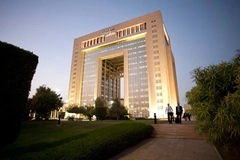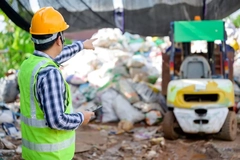Ineos prevails in securing €3.5B for Europe’s “greenest” ethane cracker despite environmental resistance

14 Feb 2023 --- Ineos has secured €3.5 billion (US$3.7 billion) in funding for its Project One ethane cracker in the Port of Antwerp, Belgium. The financing follows a tide of environmental opposition against the facility, which is accused of threatening local environmental and human health and putting investors at serious financial risk.
Ineos’ Project One will be the biggest industrial chemical investment in Europe in the past 20 years and, according to the company, make the EU competitive again with regions like Asia and the US, where development has driven ahead.
According to Ineos, the plant is designed to use low-carbon hydrogen and as soon as enough becomes available, the cracker will have a zero-carbon footprint. The cracker will also have the lowest carbon footprint of all European crackers – “five times better than the worst in Europe and two times better than the best.”
The announcement comes days after the European Commission declared support for a nuclear-based definition of “low carbon hydrogen.” Jason Meers, CFO of Ineos Project One, says the investments are a “game changer” for Europe. “It will bring new opportunities to the chemical cluster in Antwerp as well as strengthen the resilience of the whole European chemical sector.”
 Construction in the Port of Antwerp is underway.Opposing voices
Construction in the Port of Antwerp is underway.Opposing voices
The road to achieving Ineos’ plans in Antwerp has been long. Environmental campaigners opposed the project, with 13 environmental NGOs, including ClientEarth appealing to the Environmental Ministry of Flanders to halt the project.
ClientEarth lawyer Tatiana Luján said the plans are part of “Big Oil’s Plan B” to expand plastics production and keep the fossil fuel industry alive.
While Project One’s pledge to slash the carbon footprint of European ethane crackers and raise production levels back toward a globally competitive position, fears abound the project will “not only have devastating local environmental and climate impacts but also global consequences,” according to Luján.
“The plastics these projects produce help emit CO2 at each stage of their life cycle. It’s this ‘slow-burn’ factor of plastics that continues to go unaccounted for.”
However, campaigners failed to block the Project One construction through legal means and the Belgian government green-lit the project last year.
Financial risks  Ineos says Project One will create hundreds of jobs and enrich the local community.Regardless of Ineos’ plans to produce the lowest carbon-emitting ethane cracker in Europe, expanding production and making greener energy competitive for the global market, some financial analysts say the project poses serious economic risks for the bloc’s banks and administrations.
Ineos says Project One will create hundreds of jobs and enrich the local community.Regardless of Ineos’ plans to produce the lowest carbon-emitting ethane cracker in Europe, expanding production and making greener energy competitive for the global market, some financial analysts say the project poses serious economic risks for the bloc’s banks and administrations.
The €3.5 billion (US$3.7 billion) financing will come from 21 commercial banks, including JP Morgan Chase, Barclays, HSBC, Citigroup, BNP Paribas and ING Group. This comes along with export credit agencies of the UK, Spain and Italy, and a loan guarantee of up to €500 million (US$537 million) from Gigarant, part of the Flemish government.
However, NGO FairFinn says the banks and governments involved are “risking billions” as global litigation against plastic use tightens throughout the world.
Amadeo Ghiotto, an analyst at FairFin, told PackagingInsights Ineos is taking such a risk because it has been guaranteed the biggest bailout of public taxpayer money to a private corporation in many years.
“Such a big guarantee, and yet there has been no real research into policy, financial and environmental risk analysis,” he asserted.
By Louis Gore-Langton










